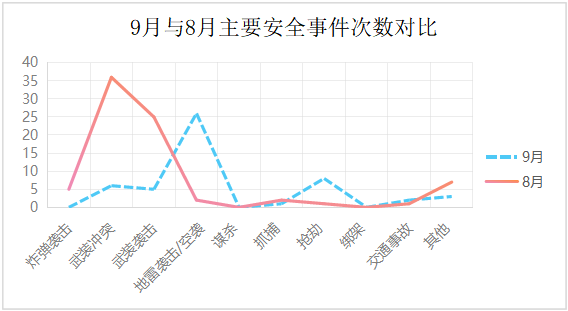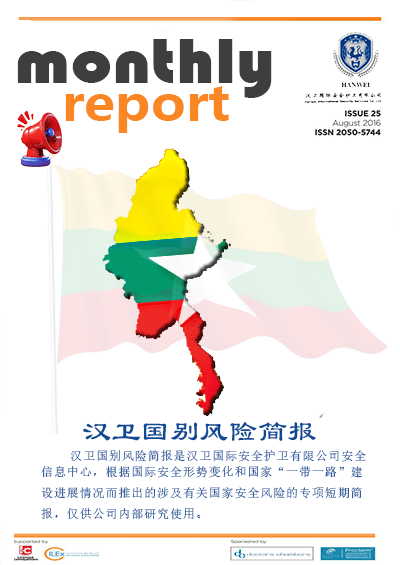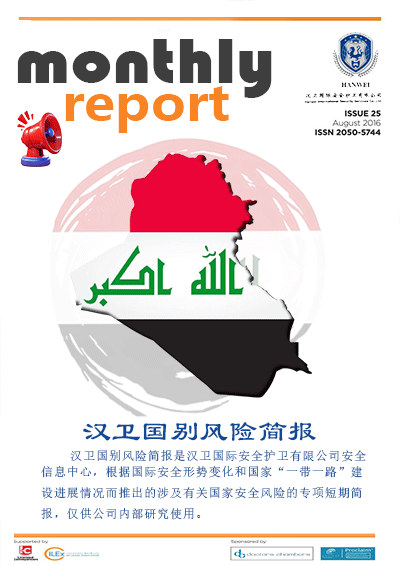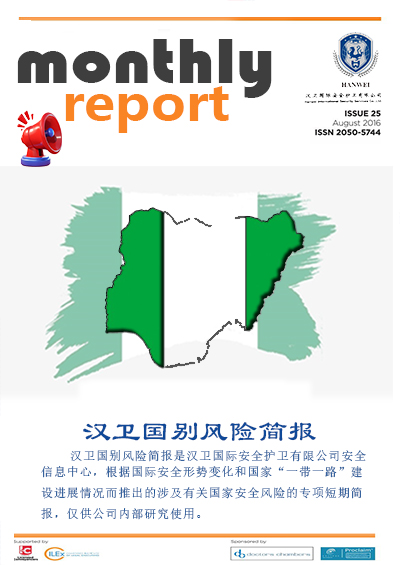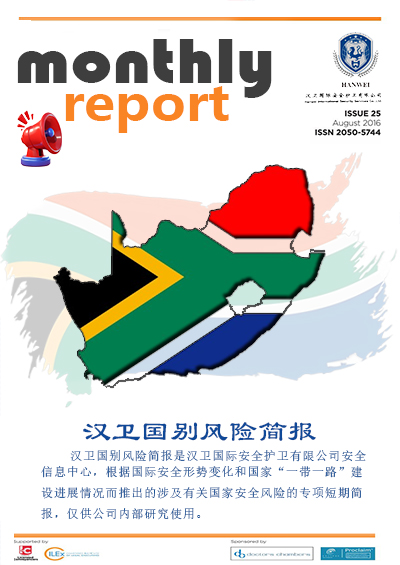Myanmar Security Situation Review September
According to the Hanwei International Security Public Opinion Report, a total of 66 representative security incidents occurred in Myanmar in September, 22 fewer than in August. These incidents resulted in 370 deaths and 614 injuries. Among the categorized security incidents, the main types were airstrikes, robberies, and armed conflicts. The security incidents mainly occurred in Shan State, Mandalay, and other areas.
Hanwei International analysis indicates that Myanmar's security situation remains tense. While the statistics show a decrease in security incidents compared to the previous month, the number of deaths and injuries surged significantly, mainly due to natural disasters and civil war. The conflict between the Myanmar military government and ethnic armed organizations continues to worsen, making it difficult to stop the turmoil in Myanmar.
Peace talks in Myanmar face difficulties, and achieving peace remains a long-term challenge. On September 2, Min Aung Hlaing declared the Myanmar National Democratic Alliance Army, the Ta'ang National Liberation Army, and the Arakan Army as terrorist organizations, signaling that the conflict between the Myanmar military government and these ethnic armed groups will further escalate into full-scale military strikes. On September 14, the Myanmar military announced that it would not accept peace negotiations and was fully prepared for counteroffensives. Myanmar stated that it would not accept interference from any country, rejected peace talks, and would launch counteroffensives across the country. All retired personnel, including logistics personnel, were required to return to duty, and all petroleum products, including gasoline and diesel, would be suspended for civilian sale and prioritized for military use. The Myanmar military government called on ethnic armed groups to cease fighting and engage in peace talks, but several ethnic armed organizations refused. On September 26, the Myanmar military government invited various ethnic armed groups to negotiate, urging them to stop fighting to ensure regional peace and stability. It demanded that ethnic armed groups engaged in combat with the military cease using force and instead resolve issues through political dialogue. On September 28, the Ta'ang National Liberation Army, People's Defense Force, Chin National Army, and Myanmar National Democratic Alliance Army, among others, responded by refusing to participate in the peace talks proposed by the military government.
On September 23, the commander-in-chief of the Arakan Army announced that the Arakan Army would strive to strengthen its relationship with China. After the Chinese government pressured Myanmar's ethnic armed groups, the Arakan Army is exploring cooperative relations with China and hopes to establish mutual friendly ties. Currently, fighting between the Arakan Army and the Myanmar military government continues in Kyaukpyu Township, Rakhine State, but the Arakan Army stated that it would protect Chinese projects and personnel in Rakhine State. On September 24, Japan became the latest country to downgrade diplomatic relations with the Myanmar military government. According to informed sources, the term of Japan's ambassador to Myanmar, Ichiro Maruyama, is about to end, and Japan plans to replace him with a lower-level diplomatic representative. On September 27, Chinese Foreign Ministry spokesperson Lin Jian stated at a regular press conference that China firmly supports a Myanmar-led peace process and hopes that all parties in Myanmar will cease fighting and engage in talks to resolve differences within the constitutional framework and restart the democratic transition process. Japan downgraded its diplomatic relations with the Myanmar military government.
The Myanmar kyat continues to depreciate, making economic recovery difficult. The Central Bank of Myanmar announced on September 25 that it sold over $12 million and 700,000 yuan in the foreign exchange market at a rate of 1:3,524 kyat. Recently, due to the central bank's continuous sale of US dollars, the exchange rate of the US dollar in Myanmar's external market has been declining. On September 26, the exchange rates in Myanmar's external market were 1 US dollar to 5,020 kyat, 1 Thai baht to 149.25 kyat, and 1 Chinese yuan to 697 kyat. Ethnic armed groups in Karen State held a meeting to discuss reopening highways. On September 27, ethnic armed groups in Karen State held an informal meeting in Kawthoolei, Karen State, where other armed groups urged the Karen National Liberation Army to reopen the Asian Highway and allow passage for other ethnic armed groups. The Myawaddy-Kawkareik section of the Asian Highway is a crucial trade route between Thailand and Myanmar. The Myanmar Investment Commission held its 8/2024 meeting on September 30 in Naypyidaw, where it approved applications for increased investment capital for ongoing projects and eight new investment projects in the industrial, service, oil and gas, and transportation and communication sectors. These projects, with investments totaling $9.255 million and 46.005226 billion kyat, are expected to create 1,972 jobs.
Frequent natural disasters make life and work difficult. In September 2024, Myanmar experienced unprecedented floods nationwide, triggered by Typhoon Yagi. According to reports from Myanmar's fire department and rescue organizations, as of the morning of September 24, the floods had caused 419 deaths, 89 missing persons, and severely affected the lives and work of hundreds of thousands of people. This disaster not only tested the Myanmar government's emergency response capabilities but also drew international attention and aid. From September 23 to 24, a joint operation targeting illegal online financial fraud syndicates was conducted in Muse, northern Shan State. The operation, commanded by Myanmar's State Administration Council (SAC), was carried out by military police and local administrative departments to combat transnational fraud activities and maintain peace and stability in border areas. After two days of efforts, 194 Chinese suspects (188 male and 6 female) and 355 Myanmar suspects (160 male and 195 female) were arrested.
Airstrikes intensified, and regional fighting was fierce. On September 3, a police station in Myawaddy, Karen State, was attacked by drones dropping multiple bombs, killing 3 people on the spot and injuring more than 10. Subsequently, 2 more people died during treatment, bringing the death toll to 5, including several local officials and police personnel. Media reported that fighting broke out in Hsay Dang village, Kachin State, on September 7, leading almost all residents of Hsay Dang village and surrounding areas to flee. From the start of the fighting until September 17, tens of thousands of people had fled, and large-scale clashes continued in Hsay Dang village. On the morning of September 11, a village near Dawei, Tanintharyi Region, was bombed by the military, killing 4 people. Around 1 PM on September 12, a gold shop in Block 1, Myitkyina, Kachin State, was robbed by two armed men who stole 51 gold items. On the evening of September 17, Myanmar's State Administration Council Information Team announced that a village in Sagaing Township, central Myanmar, had been attacked by armed groups using heavy and light weapons that morning, resulting in 12 deaths and 3 injuries. Around 11 PM on September 23, armed clashes continued between SAC-affiliated military police and local militias in Muse, northern Shan State, during operations against fraud syndicates. On September 26, Myanmar military government aircraft dropped 4 bombs on the Environmental Protection Office and City Hall in Thandwe, Rakhine State, killing at least 14 people and injuring 25. On September 27, the Myanmar military government launched airstrikes on Myebon, Taungup, and Thandwe townships in Rakhine State, killing at least 20 people and injuring 3. On September 25, the Myanmar military government attempted to recapture Momauk Township in Kachin State's Bhamo district, which fell in August, leading to clashes with the Kachin Independence Army. The military deployed over 100 soldiers and armored vehicles to reinforce the Bhamo district, but the Kachin Independence Army and its allies ambushed the reinforcements in Aung Myay village, prompting the military to conduct airstrikes against the village.
Hanwei International recommendations: Given the tense situation in Myanmar, avoid areas where conflicts occur between the military and ethnic armed groups. In case of sudden clashes, follow security personnel's instructions, quickly seek cover, and move to safe locations. Due to recent floods, avoid unnecessary travel. If travel is necessary, bypass severely flooded areas, stay alert, and walk close to buildings to avoid falling into manholes or pits. Check your residence; if it's old or in a low-lying area, relocate promptly.
Myanmar emergency numbers: Police: 0095-199 Medical: 0095-192 Chinese Consulate General in Mandalay Consular Protection and Assistance: 0095-9-259172726 Chinese Embassy in Myanmar Consular Protection and Assistance: 0095-9-43209657 Ministry of Foreign Affairs Global Consular Protection and Service Hotline (24/7): 0086-10-12308 or 0086-10-65612308
Chart 1: September Security Incident Categories

Chart 2: September Deaths/Injuries Statistics
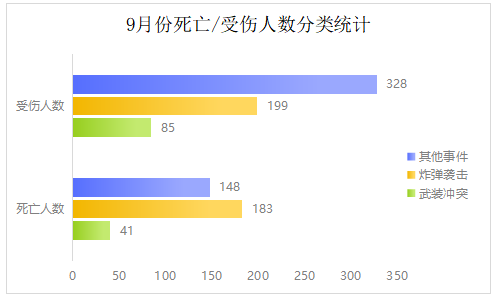
Chart 3: September Security Incidents by Major State
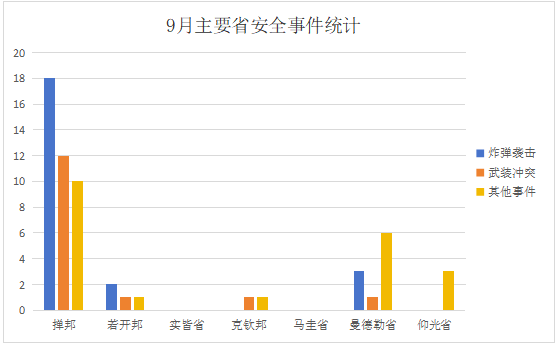
Chart 4: September vs August Major Security Incident Comparison
